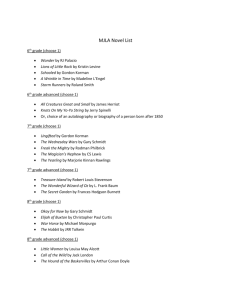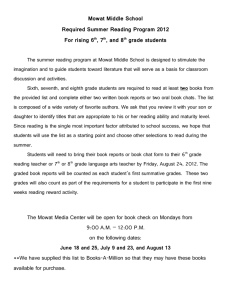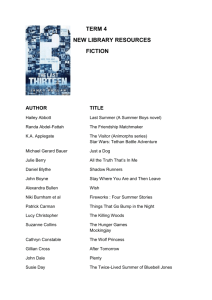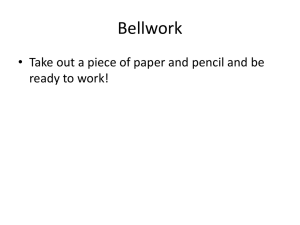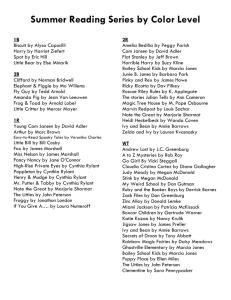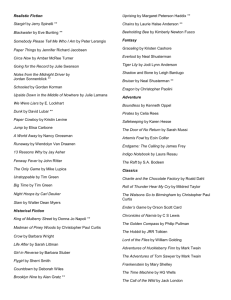广东外语外贸大学国际工商管理学院 《组织行为学》考试卷 考核对象
advertisement
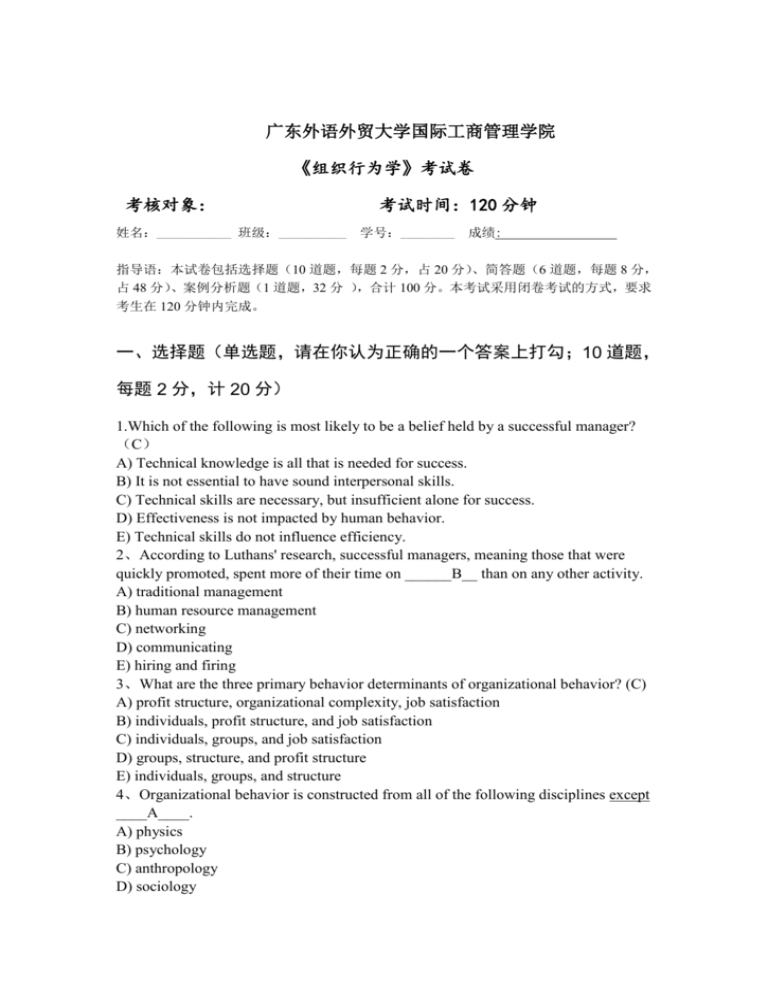
广东外语外贸大学国际工商管理学院 《组织行为学》考试卷 考核对象: 考试时间:120 分钟 姓名:___________ 班级:__________ 学号:________ 成绩: 指导语:本试卷包括选择题(10 道题,每题 2 分,占 20 分)、简答题(6 道题,每题 8 分, 占 48 分) 、案例分析题(1 道题,32 分 ),合计 100 分。本考试采用闭卷考试的方式,要求 考生在 120 分钟内完成。 一、选择题(单选题,请在你认为正确的一个答案上打勾;10 道题, 每题 2 分,计 20 分) 1.Which of the following is most likely to be a belief held by a successful manager? (C) A) Technical knowledge is all that is needed for success. B) It is not essential to have sound interpersonal skills. C) Technical skills are necessary, but insufficient alone for success. D) Effectiveness is not impacted by human behavior. E) Technical skills do not influence efficiency. 2、According to Luthans' research, successful managers, meaning those that were quickly promoted, spent more of their time on ______B__ than on any other activity. A) traditional management B) human resource management C) networking D) communicating E) hiring and firing 3、What are the three primary behavior determinants of organizational behavior? (C) A) profit structure, organizational complexity, job satisfaction B) individuals, profit structure, and job satisfaction C) individuals, groups, and job satisfaction D) groups, structure, and profit structure E) individuals, groups, and structure 4、Organizational behavior is constructed from all of the following disciplines except ____A____. A) physics B) psychology C) anthropology D) sociology E) social psychology 5、The _____A___ component of an attitude is the emotional or feeling component of that attitude. A) affective B) cognitive C) behavioral D) evaluative E) reaffective 6、Any incompatibility between two or more attitudes or between behavior and attitudes results in _____B___. A) organizational dissonance B) cognitive dissonance C) attitudinal clarification D) values clarification E) affective reactance 7、If an employee expresses organizationally desired emotions during interpersonal transactions, which of the following is being expressed? (C) A) emotional labor B) negative affect C) positive affect D) emotional intelligence E) deviance 8、Which of the following is a person's ability to be self-aware, detect emotions in others, and manage emotional cues and information? (A) A) emotional intelligence B) affective events theory C) emotional external constraints D) affective emotions E) cognition 9、Which of the following is the best definition of personality? (E) A) Personality is an aggregate set of traits that are mostly determined at birth. B) Personality is an aggregate set of traits that are determined over a person's lifetime. C) Personality is all the ways in which an individual reacts to and interacts with others. D) Personality is, for the most part, comprised of traits that cannot be measured or defined. E) Personality is the static organization of how a person reacts to different environments. 10、How would you describe an individual who is capable of presenting striking contradictions between who they are in public and who they are privately? (D) A) low Mach B) high Mach C) low self-monitoring D) high self-monitoring E) narcissistic 二、简答题(6道题,每题8分,计48分) 1、Describe and explain the five-stage group-development model • • • • • Forming—group begins and there is a level of uncertainty Storming—conflict over direction Norming—conflict resolution and generation of team spirit Performing –collaboration and goal achievement Adjourning—end of group 2、What Is The Potential Sources of Stress?Describe and explain it briefly While environmental factors are forces outside the organization, which may act as potential sources of stress due to uncertainties and threats that they create for any organization and its members, factors within organization can also act as potential source of stress. Together or singly they may cause a tense and volatile working environment which can cause stress for organizational members because the inability of individuals to handle the pressures arising out of these sources. 3、What is Fiedler’s contingency model? The Fiedler Contingency Model was created in the mid-1960s by Fred Fiedler, a scientist who helped advance the study of personality and characteristics of leaders.The model states that there is no one best style of leadership. Instead, a leader's effectiveness is based on the situation. This is the result of two factors – "leadership style" and "situational favorableness" (later called "situational control"). 4、What is The Key Point of Two-Factor Theory ? The presence of one set of job characteristics or incentives lead to worker satisfaction at work, while another and separate set of job characteristics lead to dissatisfaction at work. Thus, satisfaction and dissatisfaction are not on a continuum with one increasing as the other diminishes, but are independent phenomena. This theory suggests that to improve job attitudes and productivity, administrators must recognize and attend to both sets of characteristics and not assume that an increase in satisfaction leads to decrease in dissatisfaction. 5、Explain in some detail two common decision biases or errors. Use examples in your answer. Confirmation Bias: The rational decision-making process assumes that we objectively gather information. The information we gather is typically biased toward supporting views we already hold. This confirmation bias influences where we go to collect evidence because we tend to seek out places that are more likely to tell us what we want to hear. It also leads us to give too much weight to supporting information and too little to contradictory information. Availability Bias: Many more people suffer from fear of flying than fear of driving in a car. The reason is that many people think flying is more dangerous. If flying on a commercial airline was as dangerous as driving, the equivalent of two 747s filled to capacity would have to crash every week, killing all aboard, to match the risk of being killed in a car accident. But the media give a lot more attention to air accidents, so we tend to overstate the risk of flying and understate the risk of driving. 6、Give a detailed explanation of how managers can use re-inforcement to shape employee behaviour. 1. Set Clear and Reasonable Expectations The use of reinforcement to motivate employees should be a positive experience for both of you. Unclear task expectations and evaluation standards frustrate employees and reduce the tendency to attempt the desired behavior. 2. Identify Strong Motivators Working with employees to identify personalized motivators, or reinforcements, is most likely to produce the desired results. 3. Encouraging Desirable Behaviors Most managers want to encourage positive employee behavior such as punctuality, strong teamwork and quality production. According to reinforcement theory, choosing one positive attribute to target at a time and applying positive reinforcement techniques with a focus on extinction of the negative behavior, can help you turn desirable traits into strong work habits over time. 4. Effectively Using Reinforcement Time your reinforcements carefully because different strategies yield different results. Rewarding a behavior, such as an excellent performance, each time it occurs will quickly result in repeated performances. 三、案例分析题(1题,32分)Dianna Abdala To illustrate how precious e-mail is, consider the case of Dianna Abdala. In 2005, Abdala was a recent graduate of Suffolk University’s law school, and she passed the bar exam. She then interviewed with and was offered a job at a law firm started by William Korman, a former state prosecutor.The following is a summary of their e-mail communications. Original Message From: Dianna Abdala Sent: Friday, February 03, 2006 9:23 p.m. To: William A. Korman Subject: Thank you Dear Attorney Korman, At this time, I am writing to inform you that I will not be accepting your offer. After careful consideration, I have come to the conclusion that the pay you are offering would neither fulfill me nor support the lifestyle I am living in light of the work I would be doing for you. I have decided instead to work for myself, and reap 100% of the benefits that I sew [sic]. Thank you for the interviews. Dianna L. Abdala, Esq. Original Message----From: William A. Korman To: Dianna Abdala Sent: Monday, February 06, 2006 12:15 p.m. Subject: RE: Thank you Dianna Given that you had two interviews, were offered and accepted the job (indeed, you had a definite start date), I am surprised that you chose an e-mail and a 9:30 p.m. voicemail message to convey this information to me. It smacks of immaturity and is quite unprofessional. Indeed, I did rely upon your acceptance by ordering stationary [sic] and business cards with your name, reformatting a computer and setting up both internal and external e-mails for you here at the office. While I do not quarrel with your reasoning, I am extremely disappointed in the way this played out. I sincerely wish you the best of luck in your future endeavors. Will Korman ----Original Message----From: Dianna Abdala Sent: Monday, February 06, 2006 4:01 p.m. To: William A. Korman Subject: Re: Thank you A real lawyer would have put the contract into writing and not exercised any such reliance until he did so. Again, thank you. Original Message From: William A. Korman To: Dianna Abdala Sent: Monday, February 06, 2006 4:18 p.m. Subject: RE: Thank you Thank you for the refresher course on contracts. This is not a bar exam question. You need to realize that this is a very small legal community, especially the criminal defense bar. Do you really want to start pissing off more experienced lawyers at this early stage of your career? Original Message From: Dianna Abdala To: William A. Korman Sent: Monday, February 06, 2006 4:28 p.m. Subject: Re: Thank you bla bla bla After this e-mail exchange, Korman forwarded the correspondence to several colleagues, and it quickly spread exponentially. Questions 1、With whom do you side here—Abdala or Korman? I will support Abdala. 2、What mistakes do you think each party made? Abdala: I think she should inform Korman of his reject of the offer ahead of time. It is too late to write an e-mail to Korman to let him know the reason of his reject. Because Korman has did everything for her on-borad. Therefore,Korman will be very angry with her. Korman: Although Abdala didn’t give him clear answer in time, he thought Abdala will work for his firm just because she took the interview. They didn’t have contract yet. It is quite early to prepare for her on-borad. Moreover, he shouldn’t forward the e-mail to other people. 3、Do you think this exchange will damage Abdala’s career? Korman’s firm? I think it will have some negative effect on Abdala’s career and Korman’s firm. People in this field will think that Abdala is a person short of integrity. Moreover, as a new comer, Abdala is a little arrogant and high-demanding. The fame of Abdala will be influenced by this. As for Korman’s firm, it also will be affected. The employees of this firm will afraid that there is no privacy because Korman forward the e-mail to others. 4、What does this exchange tell you about the limitations of e-mail? Limitation: 1. It will cause some misunderstanding of each other by using e-mail since the two parties cannot communicate face to face and some information will be distorted. 2. E-mail is easy to spread by the Internet. It is hard to protect the privacy of each party. 3.The information that an e-mail conveyed cannot be read in time. Sometimes, it will cause some big problems.
